
Future-proofing your EU funding strategy for the post-2027 period
Preparing for EU funding for the post-2027 period? Learn what organisations can do now to align with policy shifts, build partnerships and strengthen readiness.
Are you a smaller or medium sized NGO, public authority or company and have a great project idea, but unfortunately you don’t have the funds to implement your project? EU funded project support may be an option, but you are not sure where to start looking for concrete funding opportunities and how to write a successful application?
How to write a compelling grant application may not seem very straightforward and the EU funding subject as such a bit intimidating. Let’s clear the fog and give you a much clearer picture where you find suitable funding opportunities and which main points need to be considered before writing your funding application.
First of all, the good news is that the EU wants to fund good projects. So if you have an amazing proposal for a project you are very welcome to submit your application! On the one hand, the EU funds projects because it aims to improve the economic and societal development in its regions. The aim is to help deprived regions with high levels of poverty and unemployment. On the other hand, the EU also funds innovation, excellence and new approaches to be more competitive as a continent on the global stage. They are therefore seeking for projects that help achieving this.
Another reason why the EU funds projects is that they would like to accelerate the achievement of the EU’s main political priorities and targets. In this context, an increased amount of funds is currently going into the transition to a greener and more digital economy and society. Yet, funding for education, social inclusion and needs of citizens surely continue to play an important role as well.
Let’s break down the main aspects to consider when you are wondering if your project idea could be funded and how to find the most promising funding programme.
First of all, before you invest your precious time and resources into writing a project application, you need to be sure that you have found the most suitable funding programme for your specific project and that you have understood its terms and conditions. Starting the process well prepared can save you a lot of disappointment and time wasted. After all, you know that it is crucial for the success of your organization to make the best use of your time as the actual purpose of your work is to serve your own clientele and beneficiaries the best way you can. In the following you will find the 6 main areas you need to check before starting your application for EU funding.
Before embarking on the quest for EU funding, the most important question to ask is if your project would be suitable for EU funding at all. First, you need to determine if your project has a European dimension or a merely local impact and by who it will be carried out. This is not a straightforward task, but all in all it comes down to the following main aspects:
If you plan a project with international partners, there is a higher likelihood that EU funding could be acquired. For some programmes, an international cooperation within the EU and certain countries that are associated to the programme, is a prerequisite. One example are the Calls for Proposals/ grants for the EU Framework Programme for Research and Innovation – Horizon Europe (NB: Within Horizon, funding possibilities for individual researchers are existing as well, but such individual schemes are not subject of this article).
Projects which are funded through Horizon Europe very often (but not always) have a multi-annual duration and a larger budget allocation per project (for example around 1-5 million € – to give you a rough idea). If you are a smaller or medium sized organization you may not have the operational or financial capacity to be the coordinator such a big project. However, you could fit very well as one of the project partners in the consortium implementing specific tasks.
In case you will be carrying out your project all by yourself, without any international partners and without any direct international context, there is still a possibility that an EU programme exists where it fits in. Such more placed-based funding opportunities can in particular be found within the EU Structural Funds. Some of these programmes are targeted at regional and local development, to catch up with the EU’s average wealth level, and to make your region more innovative, digital and sustainable. Or they provide financial support for, to give a few examples, start-ups, business growth, social inclusion measures, enhancing disadvantaged people’s chances on the labour market and to raise the skills levels in the region. Support for training measures and trainings schemes play an important role here.
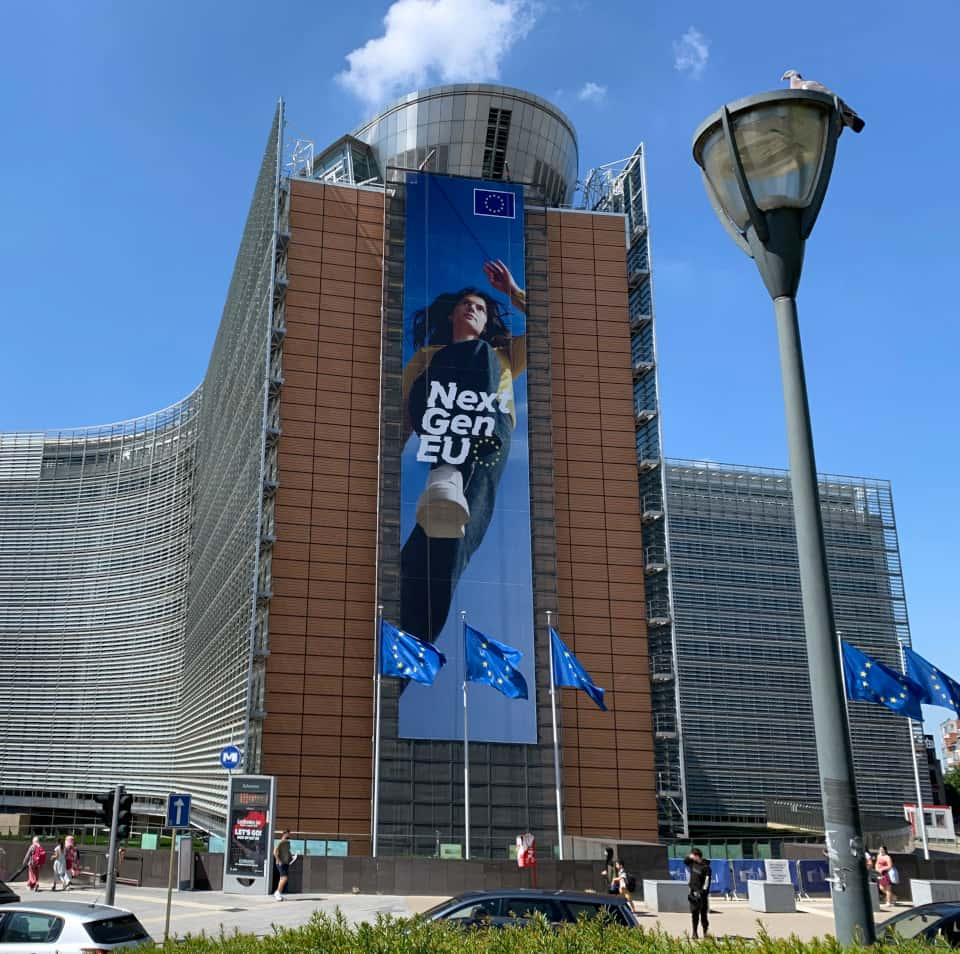
All in all, there are around 40 different EU funding programmes in the period 2021-2027. Have a look and check what is available in your particular field – you can find a thematic overview of the programmes on the website of the European Commission.
As discussed above, the suitability for EU funding depends on the overall purpose of your project, the topic and your foreseen way of implementing it. Once you have concluded that your project idea could fit into one (or more than one) of the existing EU funding programmes, you will need to collect more information about the specific requirements and conditions of the particular programme and find out if there are currently any specific open application procedures.
The most important place where you can find current funding opportunities and a forecast of the Calls for Proposals for the near future is the Funding & Tenders Portal of the European Commission. The portal includes the opportunities for EU tenders (NB: tenders are not the subject of this article) and the grants for the programmes that are managed directly by the EU. Examples are Horizon Europe, the Programme for the Environment and Climate Action (LIFE) and the Citizens, Equality, Rights and Values (CERV) programme. You can search for funding opportunities by programme, topic or by keyword search.
In case you find an open Call for Proposals for a grant, the Call text will indicate the main conditions for participation and what kind of project is being sought for funding. In some cases, the expectations for the projects are very precise, in other cases there is some more room for variations.
The published Call text will explain the requirements for participation and what is expected from a project proposal to be able to receive funding. The text states the basic conditions for participation and all the documents and information you need to provide so that your proposal is considered admissible and eligible. Conditions can for example refer to the legal status or the location of your organization. Sometimes there are specific conditions in terms of your organisation’s operational or financial capacity to be eligible to apply for a Call.
The Call text will also outline what types of activities are eligible to be funded. At this point, you could possibly consider to adapt your project contents so that they are better aligned with the Call conditions to increase your chances of success.
Another aspect for EU funding is if your organisation can apply alone or if you need a certain number of partners. In Horizon Europe for example, it is obligatory for project consortia to have one partner from a EU Member State plus two partners from different countries (either from the EU or a country which is associated to Horizon Europe). Well, this is the norm, but it is possible, that the specific work programme or Call for Proposals could foresee something different in exceptional cases.
One very important question is how much funding you can expect. Check if you will be able to have 100% of your project financed by the EU budget. However, bear in mind, that there are usually own costs that are e.g. related to your general operations which will not be reimbursed. Funding rates vary from programme to programme and sometimes also between sub-sections within a programme. Funding rates usually range from 30% to 100%. Make sure that you will have the required own contribution to be able to carry out the project until its end. Once you sign a grant agreement with the EU, you are obliged to carry out the project as planned and to provide proof that you have carried out your foreseen activities. If you fail to do so, the grant can be reduced or canceled and already disbursed EU funds be claimed back.
Via the Call website, you will find links to the template of the application form, an online manual how to use the Funding & Tender portal and an IT manual which explains the application process on the portal step by step, with many screenshots. During the opening period of the Call, the EU also adds frequently asked questions to the Call website where you could already find answers to the open questions. You will usually also find an email address or form to fill out where you can submit a question yourself.
When applying for a grant, you will fill out the application form online in the web portal of the Funding & Tenders Portal. However, it is highly recommendable to download the application form template beforehand and analyse it very thoroughly.
The application form will give you a good overview of what is expected from you. On the one hand, it shows the different sections of the form such as for example the project summary, the description of the activities and milestones you plan to achieve, the details required for each consortium partner, and other Call-specific information that has to be provided. Be sure to collect this information on time. Moreover, there is often a page limit for the proposal and character limits for the different sections. Knowing beforehand into how much detail you can or should go can save you a lot of time.
In the application form you will also see the budgetary table where you will have to divide your costs up into different predefined cost categories. These details have to be provided and be agreed upon internally in your organisation and coordinated with the project partners before the submission of the proposal.
It takes time to prepare a project application, be sure that you start on time. The average time needed depends on the programme or Call. Roughly, it can be said that a minimum of several months in advance of the submission deadline are required. The more partners are in a consortium, the more advance time you may need for the preparation, e.g. to determine the exact division of tasks and deadlines for the different work packages and milestones, the allocated budget per partner and possibly a formal agreement that should be signed by all partners (in Horizon Europe that’s practically a must).
A Call for proposals is usually embedded in a wider context. The Call has been developed in view of the overall EU policy priorities and the projects should serve the purpose of contributing to the achievement of these policy priorities. In the Call description, you will often find a link to the current work programme (which usually runs for a period of 1-2 years) of the particular funding programme, which outlines the overall goals and expectations. Understanding the context is important and you may even have better chances to succeed if you make it clear in your application that you would indeed be contributing to these overall goals.
After reading the Call requirements and further reference documents, you might still have some very specific questions. For many programmes, the EU has established a network of national contact points where you can get more information. Depending on the country, there is a higher or lower number of qualified advisers who can help you.
For Horizon Europe, for example, the network of National Contact Points is particularly advanced in terms of personnel resources (this depends on the concerned country though) and divided up by thematic areas. I have been one of the National Contact Points myself from 2020-2023. The designated contact points are financed by the Member State administrations and have the explicit role to give advice to applicants and potential applicants in their country and often organise information sessions about the latest funding opportunities. You can discuss your project idea with them to see if there could be a chance of funding for your project. There are similar National Contact Points for the EU Programme for the Environment and Climate Action (LIFE) and the Citizens, Equality, Rights and Values Programme (CERV), to name a few.
As far as the Structural Funds are concerned, the information system works a bit different. The Structural Funds are EU funds, but nevertheless, they are managed by designated authorities in the European regions. Every region has their particular Operational Programme with its specific funding priorities for the period 2021-2027 and designated Managing Authorities.
The funding is sometimes disbursed by competitions and you will have to compete with a number of other applicants. In other cases, the funds may be subsidies which have a regional funding scheme as a basis and where you just have to fulfill certain basic conditions. The processes can be really different from region to region. But even if your project cannot be financed through that programme, the Managing Authority should usually have an idea if there is another EU, national or regional funding scheme existing where you could enquire instead as an alternative funding option.

You may be wondering if you should indeed submit your project application and how to take a decision. The most important variable would be the time and resources that you have available for preparing your application. As mentioned further above, the application procedures for the Structural Funds projects can differ from region to region. For EU funding that is directly disbursed by the European Commission and its agencies, the application process and evaluation process is very much streamlined.
At first, you should estimate how much time and effort it would take to prepare the application dossier. This is indeed easier said than done and if this is your first EU grant application it would be advisable to factor in some extra buffer time as there could be many aspects you may not have thought of. There should be one person or better several persons in a team in charge of the application. Bear in mind that the time spent and the personnel costs that have been incurred by your organisation for writing the application are not reimbursable. Only project costs that have been incurred from the confirmed start date of the grant can be declared.
At the same time it should be emphasized that it is absolutely important to submit a good quality proposal. In many or even most Calls, there is a lot of competitions. Weaknesses in the application can lead your proposal not being funded just because of a tiny difference in the evaluation score. The chances of success vary very much from one programme to another and from one Call to another.
For the directly managed EU programmes, the assessment of your project application is done through an evaluation process with independent, external experts who grade your application. Whereas the details depend again on the programme, they thoroughly analyse the concept, if your project addresses the demanded areas appropriately, your methodology, what impact can be expected from your project (wider, long-term effects), how the implementation of the project is planned and if it is deemed feasible etc. The experts will give scores to the different sections and you will need to reach a minimum score and then often one of the highest scores get the funding.
Success rates for current Calls cannot be predicted, whereas there are statistics from the previous Calls that can give an orientation. Horizon Europe is particularly competitive, with only ca. 17% of applications being funded because of a lack of available programme funds. This should not discourage you per se to throw your hat into the ring, but a reminder that your project proposal needs to be a clear fit with the Call requirements and that the content of all sections of your application need to be of very high quality. For other programmes, the success rate is much higher, and in some cases it could be enough to fulfill the minimum criteria to get funded. An option worth exploring!
There are many different EU funding opportunities and chances are that one could be the right one for your project. It’s important to get familiar with the requirements of the particular programme and Call before you start the application process. Be sure you fulfill all the conditions. The better informed you are, the better you will be able to make an efficient use of your time when going ahead with your application.
In order to succeed with your grant application, you need to be well prepared and thoroughly follow the requirements of the Call. Your project needs to be a clear match with what the Call is aiming at as there could be a high competition for your particular topic. Therefore, when preparing an application, you need to go “all in” to maximise your chances to win the grant.
Good planning is key – for the organisational as well as the financial level. Start early enough with the application so that you can address all required aspects that need to be fulfilled and collect all necessary documents. Your proposed project should be in line with what your organization is able to deliver (and, if applicable, your consortium partners too). A track record of similar activities and proven expertise in the topic will make you more convincing.
Wishing you lots of success with your project!
—
You don’t want to miss any new blog articles? Sign up for the EU Funding News & Tips.
Ready to take the next step? Discover the compact online course “Kickstart Your EU Funding Journey – Get Ready to Access EU Project Funding”

Author: Astrid Mechel
https://eufundingconsulting.eu
Hello, I am Astrid Mechel and I work (for the most part) with small and medium sized organisations who aim to access EU funding. It is my goal to help discovering suitable EU project funding possibilities and to provide support to submit a high-quality grant application. My main thematic focus is on grants for research and innovation, environmental sustainability as well as on social inclusion and participation.
Read more articles here:

Preparing for EU funding for the post-2027 period? Learn what organisations can do now to align with policy shifts, build partnerships and strengthen readiness.

EU project funding for nonprofits: Discover 6 misconceptions that hold organisations back and how to turn them into opportunities for growth and impact.

Applying for EU funding can be a complex and challenging. This article offers 12 practical tips to help you avoid the most common stumbling blocks.
Online Workshop
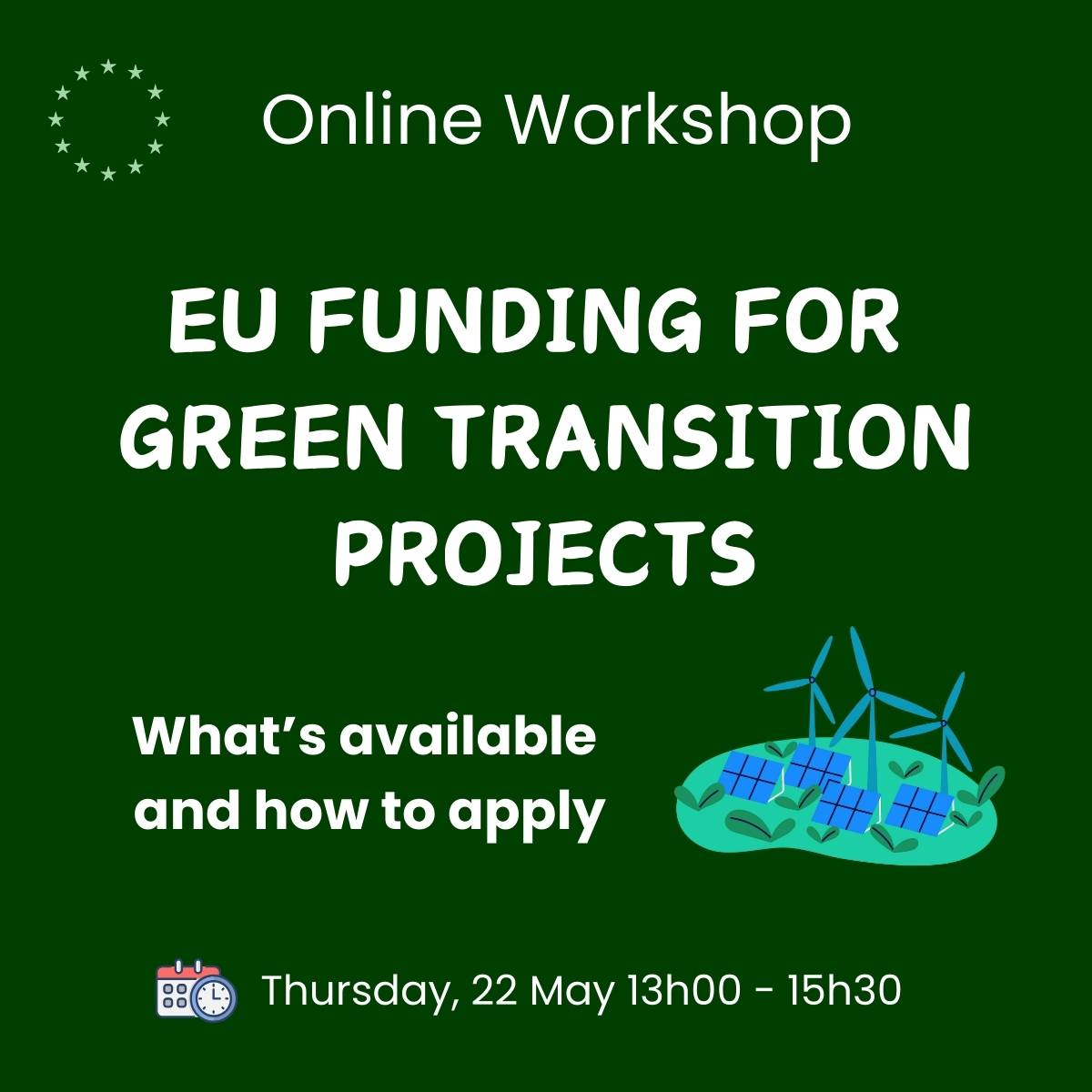
Interactive Live Workshop
On 22 May 2025 from 13h00-15h30
Registrations are closing soon

Curious about EU funding and how it could support your next project? Join the new live programme round for a compact and easy-to-follow way to get started with EU funding.
Key Terminologies – Application Guidance
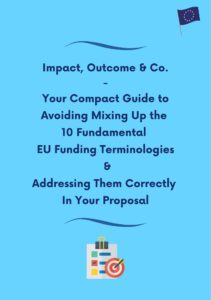
This guidance compares and compare and clarifies the 10 key terminologies within an EU funding application. How should you address them in your proposal, and what kind of information belongs to which one of them?
Online Workshop on 6 November!
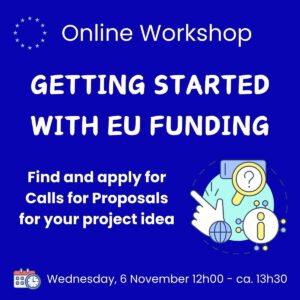
The workshop “Getting Started with EU Funding” is for participants with no or very limited experience in EU funding. Discover what kind of projects the EU is funding, the requirements and how you can apply for funding in your thematic field.
EU Funding Checklist

Do you have a new project idea and are wondering if EU funding could be available for your project?
This checklist will guide you through the most important questions to be considered when applying for EU project grants and includes some further suggestions how you could adapt your concept to be more in line with EU expectations regarding fundability.
Get the brand new upgraded guidance booklet (free offer):
Your compact guide on how they work and how your organisation can apply for funding
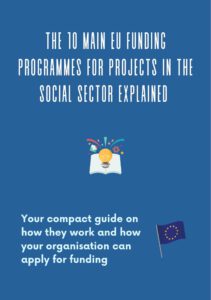
Find out which 10 EU programmes offer grants for projects in the social sector, what the conditions for funding are and how you can apply.
Online Workshop
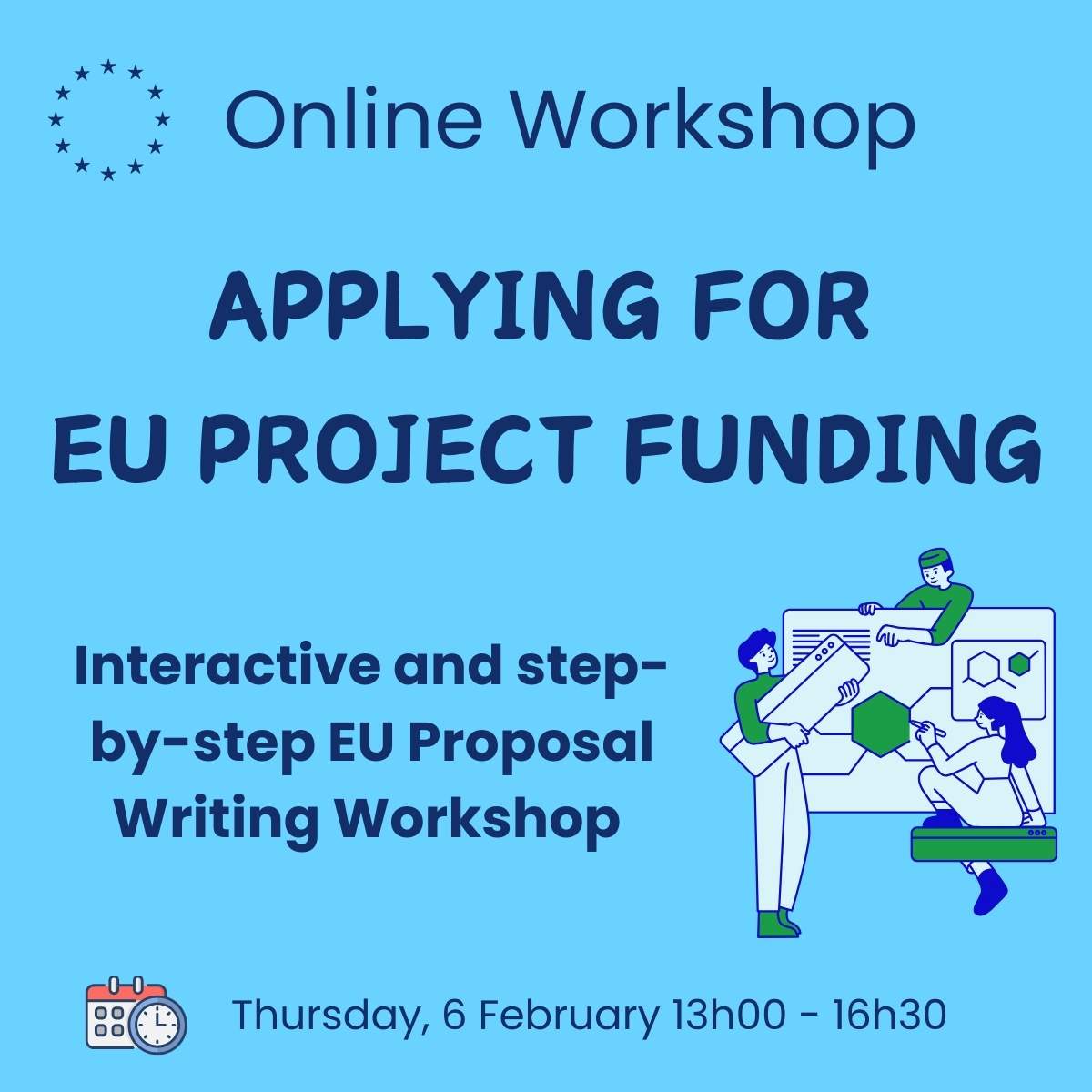
Interactive and step-by-step EU Proposal Writing Workshop
On 6 February 2025 from 13h00-16h30